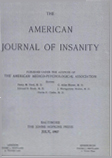THE CHANGES IN THE CONCENTRATION OF INORGANIC CALCIUM AND PHOSPHORUS DURING CONVULSIONS OF EXPERIMENTAL ORIGIN, IN CATS, BEFORE AND AFTER THYROPARATHY-ROIDECTOMY, WITH AND WITHOUT BROMIDE THERAPY
Abstract
1. The minimal convulsant and total dosage of a drug necessary to elicit convulsions is much less in cats after thyroparathyroidectomy than in control animals.
2. The number of electrical excitations of the cortical motor area possible in cats after thyroparathyroidectomy is much smaller than in controls.
3. The number of occlusions of the head arteries which can be done in animals after thyroparathyroidectomy is much smaller than in controls.
4. The administration of sodium bromide for two weeks before thyroparathyroidectomy prevents the post-operative appearance of tetany and, if continued, prolongs life for at least three or four weeks without other remedial measures.
5. In cats after thyroparathyroidectomy, the calcium phosphorus ratio is almost 50 per cent lower than in controls; the calcium phosphorus ratio in cats under bromides before operation is, however less changed, and may even approach the ratio of the controls.
6. While there is always a rise in calcium and phosphorus of the blood serum following experimentally induced convulsions, both in controls and after simple thyroparathyroidectomy, previous administration of bromides causes a fall of calcium and phosphorus following convulsions, in both sets of conditions.
Access content
To read the fulltext, please use one of the options below to sign in or purchase access.- Personal login
- Institutional Login
- Sign in via OpenAthens
- Register for access
-
Please login/register if you wish to pair your device and check access availability.
Not a subscriber?
PsychiatryOnline subscription options offer access to the DSM-5 library, books, journals, CME, and patient resources. This all-in-one virtual library provides psychiatrists and mental health professionals with key resources for diagnosis, treatment, research, and professional development.
Need more help? PsychiatryOnline Customer Service may be reached by emailing [email protected] or by calling 800-368-5777 (in the U.S.) or 703-907-7322 (outside the U.S.).



